| |
|
OPEN
TO QUESTION
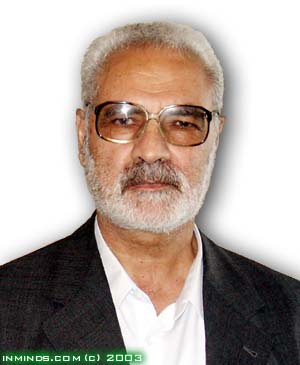
A
Conversation With
Prof.M Mohammadi
Dr. Manouchehr Mohammadi is currently professor in the Faculty of Law and Political Science of Tehran University. His PhD is in International Studies, having graduated in the United States. He is an analyst
of the Islamic Revolution and has authored several books
on the subject. Recently he has joined the newly formed
Islamic Revolution Research-Cultural Institute
which among its duties compiles and publishes
the works of Imam Khamenei.
Date: 13th September
2003
Recently we were granted an opportunity to meet with Prof. Mohammadi.
It was to be an informal chat over a pizza shared between Muslim
brothers. His answers to their questions revealed a clear insight
in to the nature of the Islamic Revolution and its relationship
with the Islamic State. Here we share the highlights of the stimulating
conversation. The audio is split in to different topics or responses
to different questions.
| He starts by differentiating between the revolution and
the political institutions in has created.
Three elements go to forms the revolution - leadership,
peoples participation and political ideology (Islam). Like
body has spirit, body and mind.
Political institution (government) is like building, and
it has 4 pillars - military, economic, legal and cultural.
Briefly compares it to other revolutions in history. The
Cuban and French revolutions were easily converted to an
institution whilst to an extent the Russian revolution went
beyond its territories.
|
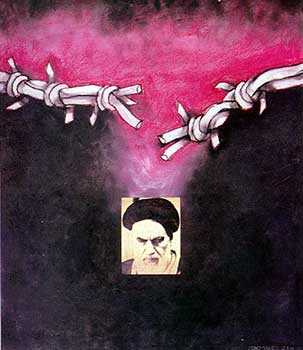
The day the chains of oppression were broken
|
2:
Insights into why did the Islamic Revolution first emerged
from a Shia society - what conditions made it more favourable
than in other Muslim societies?
|

[6:13min] |
|
|
|
Download
Part 2 (shift-click) (766Kb) |
|
There are three important elements in the Shia school of
thought which has contributed to the revolution:
1. With regards to the interpretation of rulership, according
to Shia the ruler must be "Adl" - "Just",
otherwise he is a tyrant and we must revolt against him.
As far as the Sunni school of thought is concerned it is
sufficient that the ruler has 1. The power/ability to rule
and 2.He is a Muslim.
2. The issue of ijtahad and taqlid. In the Sunni school
the doors of ijtahad have been closed a thousand years ago
after the death of the four Imams (Hanafi, Shafi, Malaki
and Hanbali) this has left the people without leaders. In
the Shia school of thought the door of ijtahad is open,
when your leader - your marja taqlid - dies you are forced
to find another leader. So the Shia has always had leaders
to follow.
3. Economic independence of the ulema. According to the
Sunni school of thought all of them are the employees of
the government - Imam-a-jamaat, Imam-a-jumma, all the mosques,
are appointed by the government. In the Shia school of thought
they are paid for by the people, not by the government,
through Khums and other sources and therefore they have been
fully independent from the government.
He also remembered the speech made by the late Dr Kalim
Siddiqui some 14 years ago in which he also raised some
of these issues. [ See Dr Kalim Siddiqui's lecture on "Convergence
in Muslim Political Thought: the contribution of Imam Khomeini"
]
|
| He starts with a recap of the nature of the Islamic revolution,
then goes on to explains the relationship between the revolution
the republic it has created:
Islamic Republic was established within the territories
of Iran to manage and run the country. Whatever debates
that go on with regards to different interpretations of
what an Islamic Republic should be are all challenges within
Iran. But they have nothing at all to do with the Islamic
Revolution which goes beyond the territory of Iran.
In other revolutions like Cuba, France and Nicaragua the
revolution was converted to an institution. But in Iran
the revolution created the Islamic Republic as a model of
a Islamic political institution running during the end of
the 20th century. Tomorrow we might have in Iraq another
model of Islamic Republic, or in Turkey or other places.
But the Islamic Revolution is universal.
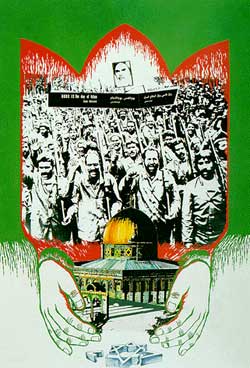
The Islamic Revolution goes beyond the territory of Iran
He then explains the global impact of the Revolution as
a turning point in human history. Talks about the European
historian Arnold Toynbee's book "Civilisation on Trail".
Toynbee says that the development of mankind is based on
the challenge of two civilisations - western civilisations
and eastern civilisation. Sometimes one triumphs over the
other and at other times the other triumphs. He says for
example during the Greek civilisation the western civilisation
was at the top of its progress under Plato, Aristotle, and
others. The Eastern civilisation was down with nothing to
offer. But with the rise of Islam the situation was changed
and during the middle ages, as they call it the "dark
ages", the western civilisation went down and eastern
civilisation rose up. The Renaissance, by Luther, was also
a turning point with western civilisation coming up.
The Islamic Revolution is also a turning point in history,
the situation is changing and we are sure that in future
western civilisation is collapsing and Islamic civilisation
is rising. In order to understand, its important to look
at the political processes not only in Iran but around the
Islamic world with this reference point.
|
|
The challenge with the West can be analysed in at least
three levels -global level, regional level and national
level. On the global level the representative of istikbar
(arrogance of power) is the United States, at the regional level the representative
of istikbar is Zionism, and at national level it
is Liberalism.
And we have four kinds of war with istikbar - political
war, military war, economic war, and cultural war...
In his belief that eventually with the present processes
Islam will triumph he sites the article by Yale scholar
Immanuel Wallerstein "The
Eagle Has Crash Landed" in which after making a
historic analysis of the situation comes to the conclusion
that the collapse of the US is imminent and unstoppable. |
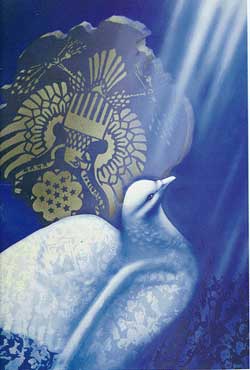
As Islam rises, the US eagle comes crashing down
|
The cultural attack has two aspects - attack on the Islamic
ideology
by the emphasis on pluralism, etc; and secondly the attack
on moral values by the promotion of pornography, etc.via
satellite, internet, etc.
|
| Look at US foreign policy from the date of the creation
of the United States, even from the creation of american society
- since Christopher Columbus. The basis of creation and birth
of American society is oppression, suppression and domination,
and even genocide...
* For more on this subject please see Genocide - An Old American Habit. |
| He is fully optimistic, and believes that those who are
pessimistic do not look from a macro level, but rather look
from a micro level. Like an ant when a drop of water covers
him he thinks that the whole world as been flooded when in
reality there is only one drop, some ordinary people will
not be able to look at the whole process from a global and
macro level. |
|
The victory of the revolution took everyone by surprise,
even the participants weren't prepared for it. So when it
happened they came to the conclusion that they had to put
all their efforts to first protect the revolution, establish
a political system and run the country.
He remembers meeting Imam Khomeini four months before the
victory of the revolution and he asked Imam about the revolution,
Imam replied that we are just at the beginning of our work.
Even Imam Khomeini didn't believe four months later the
shah would go.
The feeling was that perhaps there was still had 10 more
years to go, but all of a sudden the shahs regime collapsed.
When it collapsed nobody knew what to do - where are the
people to run the country? So they had to spend all their
cultural and religious scholars in the political system
as executives to run the country.
The intellectuals were western oriented so it wouldn't
be helpful to give the country to them, twice before they
gave the country to them (the constitutional movement and
the oil nationalisation) which resulted in defeat. The ulema
thought it would be better to go to the mosques and let
the intellectuals run the country but they betrayed the
country and gave to the westerners. This time they didn't
want to repeat the same mistakes. He explained that because
of this they were forced to give priority to the executive
power which resulted in almost all the resources being spend
on the executive, causing damage later on. He recalls himself
being placed as Governor of Khoramshar and until twelve
years ago he didn't get any chance to work on educational
and cultural affairs. Still today they have this problem.
In the meantime the global demand is huge, beyond their
capability, therefore there are short coming and they are
unable to meet the global requirements, this is a real problem.
|
|
From the psychological point of view if the demand of youth
outside Iran is different from the youth in Iran it is something
natural.
The youth in Iran has not felt American domination, western
domination first hand so they don't really know what the
situation was like under the shah's regime. But when you
go to Turkey or other countries they still feel US domination
in their day to day lives, when for example a drunk US soldier
in Turkey kills or rapes somebody they feel it. But as far
as Iranian youth are concerned they don't see it first
hand- they were born in an Islamic Republic free from American domination.
He still recalls when he was young, living under the shahs
regime, when an American lady driver killed several people
at a bus queue but there was nothing they could do to her
- she being American they couldn't even put her on trial.
He jokes that his friend says that in Arab countries the
governments are pro-American the people are anti-american,
but in Iran the government is anti-American and the people
are with americans.
|
|
In a letter to Mr Khatami recently, Dr Mohammadi ended
it with the following: The train of the revolution is going
in a right path on its own rails. Sometimes when it goes
up hill it goes slow, when down hill it goes fast, sometime
it turns right and sometimes it turns left, but still it
is on a right path. The driver is somebody else, we are
not the driver of the train. I believe the driver is Imam
Mahdi, Allah is in control. We are the passengers of that
train, we have to make sure that we are still in the train
- that we are not thrown away from the train. If we know
we are still on the train then we must be very happy about
it. In order to be on the train we have to know what is
our duty - everybody everywhere, to see what we can do...
The story of Abdul Muttalib (ancestor of our Prophet) when
he heard people are coming to destroy the Kabba he ordered
look after our camels, people said but they are coming to
destroy the Kabba! He replied the Kabba has an owner, He
will take care of it... similarly Islamic Revolution also
has an owner - Imam Mahdi. Therefore I am not worried about
the revolution, I am worried about myself - am I doing my
duty or not.
|
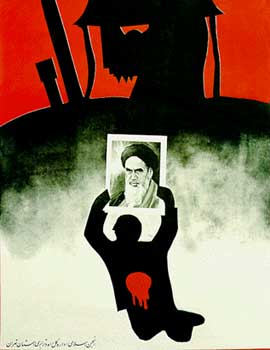
" I am not worried about
the revolution,
I am worried about myself -
am I doing my
duty or not"
© Innovative
Minds 2003
URL:
http://www.inminds.co.uk/qa-mohammadi.html
|
Back
to OPEN TO QUESTION Home
|
|





